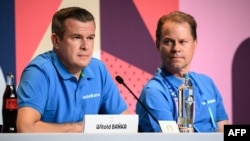The days are over when Olympics organizers and anti-doping officials would typically predict "the cleanest games ever." Not at these Paris Olympics.
"It's not our role to do it," World Anti-Doping Agency president Witold Bańka said Thursday.
"It's not that now we want to assure that every single athlete is clean. We do not," Bańka said at the agency's pre-games news conference. "It's obvious that you will never eliminate doping from the sporting landscape."
"You will always find someone who wants to cheat."
The lesson of the 2008 Beijing Olympics and 2012 London Olympics is that it can take years to judge how clean or dirty it was.
Dozens of medals were stripped and athletes disqualified years after those competitions, in large part because more advanced testing could be used on samples.
The samples taken in Paris will be stored and can be re-tested until 2034 in a program run by the International Testing Agency (ITA), the operational wing of the global anti-doping system based in the Olympic home city of Lausanne, Switzerland.
"Our role is to oversee the system," Bańka said of Montreal-based WADA, "to make sure the system is robust, to make sure that we are using all the existing tools to test athletes properly."
"And not to tell you that the Games are going to be totally clean and you will not have even one single positive test," said the 39-year-old former 400-meter runner from Poland.
WADA took one track and field athlete out of the Paris Olympics on Thursday, after winning an appeal hearing at the Court of Arbitration for Sport in Lausanne.
CAS judges imposed a two-year ban on Romanian long jumper Florentina Iusco who had tested positive last year for a banned diuretic, furosemide. WADA used its right to challenge doping verdicts worldwide after a Romanian tribunal decided she was not at fault and issued only a reprimand.
Bańka said Thursday the program overseen by the ITA took 87,000 samples from potential Olympic athletes in March to June. The best-in-class operator is likely track and field's Athletics Integrity Unit.
"Our focus has been that the Olympics and Paralympic Games are protected," Bańka said, "and the athletes are afforded a level playing field that they deserve."




